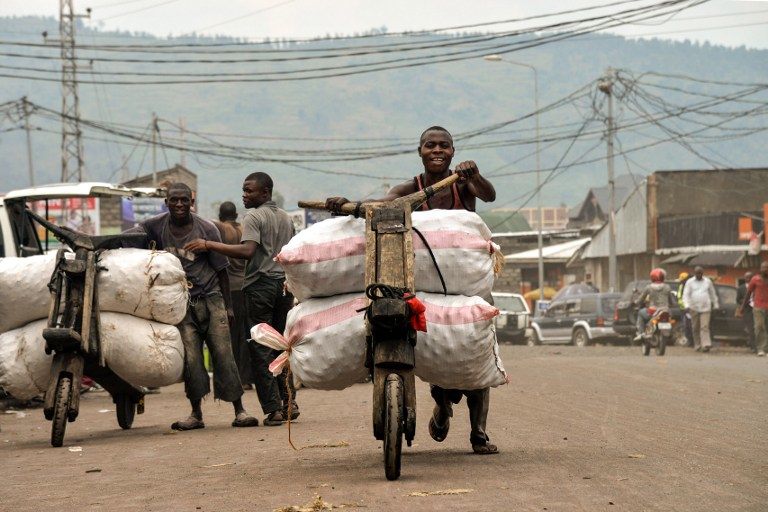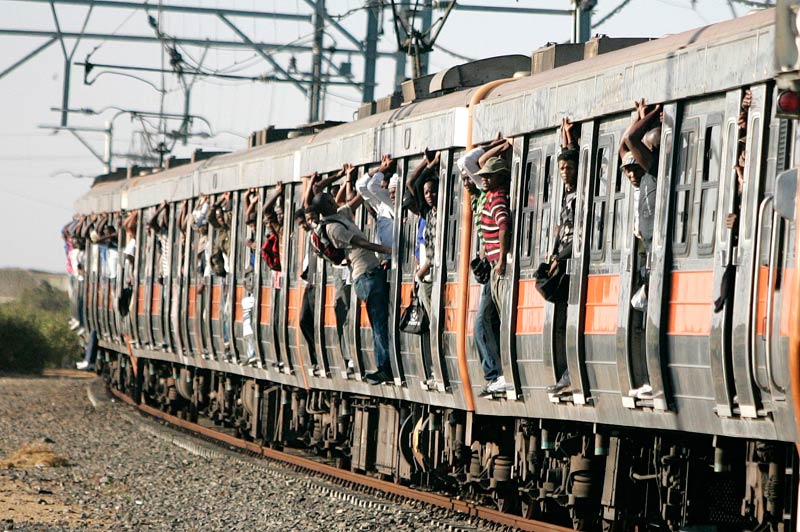What do you do when you need to deliver several hundred pounds of potatoes, 150 stalks of sugar cane, 30 eucalyptus saplings and eight sacks of coal, without motorised transport?
For residents of Goma, in the war-scarred east of the Democratic Republic of Congo, the answer to this, and many other problems, is the tshukudu.
A local but highly efficient tradition, the man-powered wooden scooters are everywhere on the paved highways and dusty sidestreets of Goma, holding their own with the motorcycle taxis.

They’re operated by a group of 1 500 proud, often burly men who not only have their own union but saw a giant, gold-coloured statue erected in their honour a few years ago in this capital of North Kivu province, on the border with Rwanda.
“The tshukudu is our whole life,” said driver Damas Sibomana.
Their vehicles, pronounced “chookoodoo”, measure about two metres long, have wide handlebars and a raised front wheel. They balance improbably large loads, as the tshukudeurs – as the drivers are known – push their vehicles along almost as much as they “drive” them.
Many drivers live outside the city and their day begins by transporting agricultural products grown in the verdant hills to the north, which feed the city’s markets. The good news? It’s downhill.
Once in the city centre the drivers await further orders for deliveries or return, again fully loaded, back to their starting point.

Jean-Marie Firiki gets up at 4am but his descent stops in Kibumba, 30 kilometres to the north of Goma, which boasts of being the tshukudu’s birthplace. The 35-year-old works as a tshukudeur at dawn and builds the machines during the day.
“A decent tshukudu costs $50 (36 euros),” Firiki said, “but the cost of a beautiful one can be $80-100” – quite a sum in DR Congo, where the majority of people live in extreme poverty.
But the boon is no fuel costs, and driver Sibomana says they can earn $10 on a good day.
There are no machines in the workshop that Fikiri shares with other craftsmen. Like most of the country Kibumba has no electricity supply. The men work the wood – here it’s eucalyptus – with a handsaw, a chisel, a plane and some sandpaper. It takes two days for a craftsman to make one scooter.
Invented in 1973
Paulin Barasiza works next to Fikiri. The 52-year-old traces the invention of the tshukudu back to about 1973.
Our fathers would sell potatoes and tobacco at a Rwandan market several kilometres away, he said. “They used wheelbarrows but these where inefficient. This is where the design came from” – inspired by bicycles.
The first tshukudus were made entirely of wood and the wheels were greased with palm oil several times a day to keep their gears from seizing up.
Sales began to pick up in the late 1980s but the decades that followed have been marred by inter-ethnic violence and regional conflicts that would ravage Kivu and still mark the province today.
It was paradoxically during this dark period that the tshukudu experienced significant upgrades: old tires glued on to protect the wheels, metal hubs and bearings and the addition of springs to aid steering.
Today, tshukudus cover vast distances and can carry up to half a tonne. Some models have a brake that works by applying friction to the rear wheel.
When a big load needs transporting to Goma, Sibomana employs two our three extra drivers for the day. Solidarity is strong, and thanks to help from other tshukudeurs, he was able to buy a field and a plot of land where he is building a house.
In early evening after a hard day’s work the scooter takes on another role: courting. The roads are full of young drivers taking their girlfriends out for a ride, both standing on the tshukudu as the man, in back, scoots it along.
The profession is held in high esteem. To have a daughter marry a tshukudeur means she “will not die of hunger”, said local historian Dany Kayeye.


